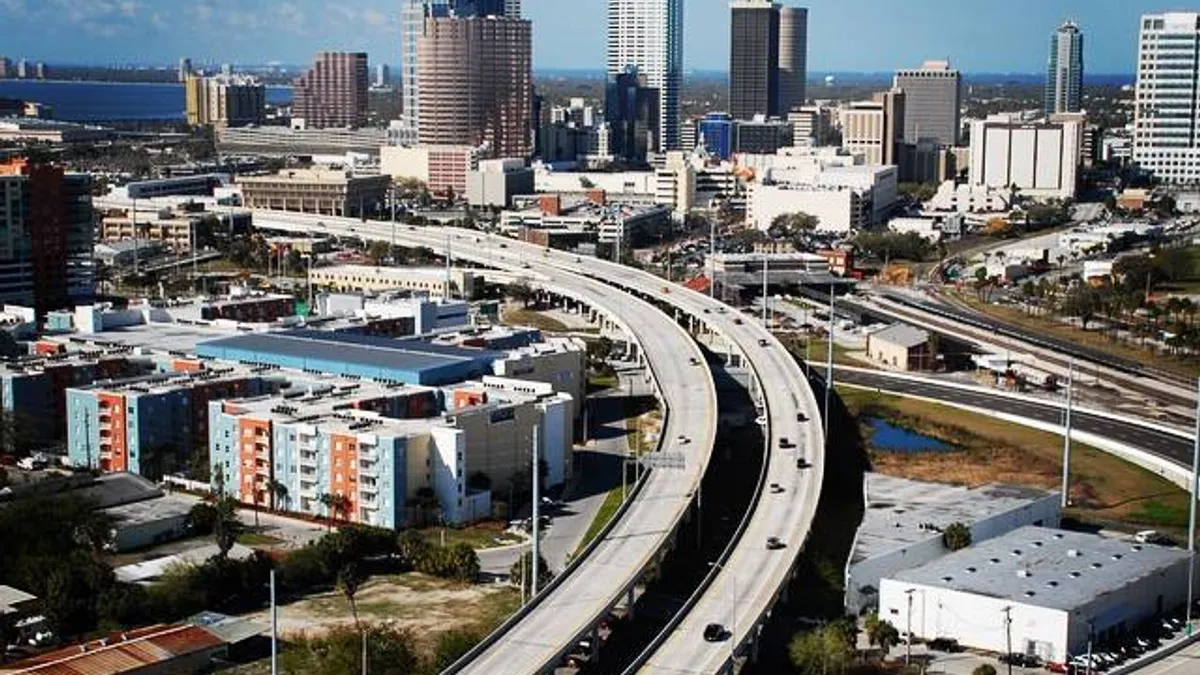Dive Brief:
- The city of Tampa, Florida, released its first ever resilience road map late last week with 58 recommendations that officials said will help the city not just prepare for the impacts of climate change but also build a stronger community.
- The plan looks to help improve opportunity and economic mobility for city residents, build thriving neighborhoods, create infrastructure that can withstand the effects of climate change and help the city become more inclusive and equitable as it continues to grow. It recommends actions like creating a community land trust to ensure more affordable housing units are built and accelerating the rollout of broadband internet, especially in majority-minority communities.
- The road map came together after 18 months of planning, including in-person and virtual workshops, phone calls, and a resident survey that received over 1,700 responses. A spokesperson for the nonprofit Resilient Cities Catalyst (RCC) said in an email that the plan is likely the first to be released during or after the coronavirus pandemic in the United States.
Dive Insight:
The coronavirus pandemic has caused many cities to rethink their futures as they seek an equitable recovery, with improved resilience as one way to strengthen communities beyond preparing for the impacts of climate change. Indeed, an RCC road map for economic resilience said a truly resilient city has stable household wealth, a strong small business community and strong social bonds.
Meanwhile, a report from ABI Research in late March last year found cities were "woefully unprepared" to respond to the coronavirus, noting they should lose their "naive 'nothing can happen to us' beliefs and adopt responsible attitudes toward resilience."
In a bid to prepare Tampa for the next crisis, Mayor Jane Castor said during a press conference that leaders and community members studied the various "shocks and stressors" — like hurricanes, floods and pandemics — that can impact the city, as well as common day-to-day issues that can also make people’s lives harder.
Castor said housing affordability will continue to be a major issue as Tampa's population continues to expand and the price of real estate also grows. The road map calls for a community land trust, a nonprofit that would own land and maintain it for affordable housing, thus helping people not be priced out of their neighborhoods.
The road map also urges investment in broadband internet, with the pandemic having highlighted the existing digital divide. In Tampa, Castor said, there is a "divide" in connectivity between areas with predominantly White residents and those with Black and Latinx residents. To try and reduce that gap, the city added Wi-Fi to its community centers in those areas to help get people online, but she urged partnerships with the private sector to try and improve connectivity long-term.
"This resiliency road map is focusing on the environment, but it's also focusing on our neighborhoods, which is critically, critically important," Castor said.
Meanwhile, the threat of climate change has officials focused on reducing the city's emissions while simultaneously strengthening its infrastructure. One proposed initiative includes having all municipal operations powered by 100% renewable energy and electrifying municipal and transit fleets, while the road map also urges resilience to be factored into planning infrastructure projects.
The plan also says the city should reexamine its parking requirements downtown and see if some of that space can be repurposed for green infrastructure. Tampa's Resiliency and Sustainability Officer Whit Remer said making those investments is "a way for us to address our climate emergency and make sure we're building infrastructure that meets the challenges of the next century."
The Tampa Bay Times' editorial board said the road map is "breathtaking for its ambition and scope," and it says Castor is "going further than any Tampa mayor in recent history." Castor said if everyone is a partner in helping implement the plan's recommendations, it can be successful.
"Tampa's future is very bright," she said. "There is no doubt that we are going to prosper as we move forward. It is our job to ensure that everyone is lifted up, that everyone gets to take part in that success and that prosperity that we are going to realize."












